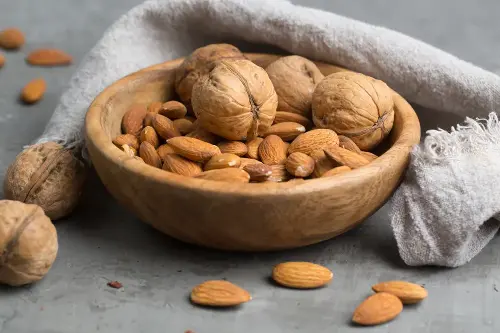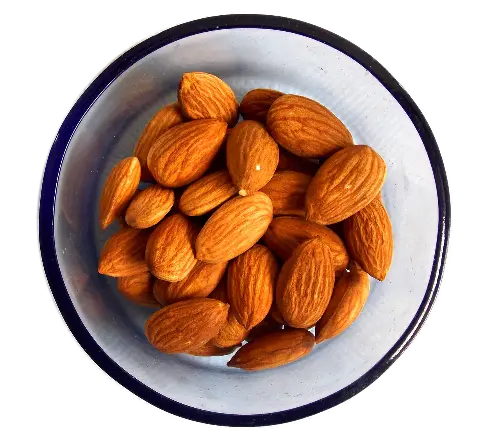
Nuts contain essential nutrients that make them beneficial for your health, supporting important bodily functions. They have gotten a bad reputa but the truth is they are much more than you realise. Far from being a diet villain, they are packed with nutrients. When nuts are added to your diet, they can help support your health, from heart health to brain function.
In an interview with HT Lifestyle, Kavita Devgan, Nutritionist and Wellness Author, said, “Nuts come under the healthy fats category as they are nutrient-dense, delicious, and incredibly versatile. Their versatility can be seen in the form of spreads, like nut butter on toast. You can also toss nuts into your salad and create a powerful mix of monounsaturated fats, plant protein, fibre, vitamins and minerals. So, indeed, nuts are a powerhouse of nutrition, especially rich in monounsaturated fats that help lower cholesterol and support heart health.”
ALSO READ: Nutritionist shares 6 healthy habits that may actually be ‘unhealthy’
Kavita Devgan shared with us a detailed guide on different types of nuts and why they are good for your health:
1. Hazelnuts

Nutritional Profile:
- One ounce (28 grams, or about 20 whole kernels)
- Calories: 176
- Fat: 17g (mostly monosaturated)
- Protein: 15g
- Fibre: 2.7g
- Carbs: 4.7g
Why they are great:
- Hazelnuts, such as Turkish hazelnuts, are rich in fibre as these nuts offer 10g of dietary fibre per 100 g.
- It is 40% of the recommended daily intake.
How often to eat:
- Consuming 25-30 grams of these hazelnuts meets 100 per cent of the recommended daily allowance for Vitamin E.
- It helps maintain healthy and youthful skin.
2. Macadamia nuts

Nutritional Profile:
- One ounce (28-30 grams)
- Calories: 204
- Fat: 22 g
- Carbs: 1.5g
- Fibre: 2.4g
- Saturated fat: 3.4g
- Polyunsaturated: 0.4g
- Monounsaturated: 17g
- Sugar: 1g
Why they are great:
- Macadamia nuts are known to be buttery and delicious. They are a powerhouse of essential nutrients and good fats which can support your overall health.
- They support your heart health, along with lowering bad cholesterol (LDL.)
- They are low in sugar and carbs, which makes them a great option for low-carb and keto-friendly diets.
How often to eat:
- You can have about 30g or 15 whole nuts daily.
- This amount provides all the health benefits of their monounsaturated fats, fibre, and essential minerals without adding excessive calories or fats to your diet.
3. Walnuts

Nutritional Profile:
- One ounce (28g)
- Calories: 185
- Fat: 18.5g (2.5g ALA omega-3s)
- Protein: 4.3g
- Fiber: 1.9g
Why they are great:
- Walnuts are one of the few plant sources of omega-3 fatty acids (ALA),which are known for supporting brain and heart health.
- Along with omega-3, they also contain polyphenols. These antioxidants help to reduce inflammation.
How often to eat:
- You can have a small handful, about 1.5 ounces of walnuts per day.
- Enjoy them raw, toasted, or chopped over salads and oatmeal.
4. Almonds

Nutritional profile
(per 28/23 almonds)
- Calories:164
- Fat: 14g (mostly monosaturated)
- Protein:6 g
- Fibre: 3.5 g
Why they are great:
- Almonds are rich in vitamin E, magnesium, and antioxidants.
- They improve skin health, support nerve function, and aid in blood sugar control.
How often to eat:
- You can have almonds on a daily basis or several times a week.
- It is a great snack, which can also be added to smoothies, or can be eaten on toast as almond butter.
Kavita later concluded the guide, explaining how one can add these nuts to the diet.
She explained, “These nuts can perfectly fit into your eating schedule, including breakfast, midday snacks, dinner, and even when you are craving something sweet. For breakfast, you can add these nuts to your oatmeal or smoothies. For your midday snack, you can keep a small bag of mixed nuts in your bag or desk drawer. For dinner, you can use crushed nuts as a crust for fish or add them as a crunchy topping for salads. When you are craving something sweet, you can go for nut-based desserts like lebkuchen, sweet mooncakes, almond cake, etc. By keeping moderation in mind, you are not only fueling your body with these nuts but also laying a strong foundation for your long-term wellness.”
Note to readers: This article is for informational purposes only and not a substitute for professional medical advice. Always seek the advice of your doctor with any questions about a medical condition.